PHOTO: Heinrich Honored by Alliance of National Heritage Areas
WASHINGTON – Today, U.S. Senator Martin Heinrich (D-N.M.), a member of the Senate Energy and Natural Resources Committee, was honored at a reception hosted by the Alliance of National Heritage Areas for his leadership to successfully pass the bipartisan National Heritage Areas Act at the end of the last Congress.
“Our National Heritage Areas support a wide range of arts and cultural organizations and historic sites, including in Hispanic and Pueblo communities in northern New Mexico. At the end of the last Congress, I was proud to champion legislation to provide our National Heritage Areas—including the Northern Rio Grande NHA in my home state of New Mexico—the stability and certainty they have long deserved,” said Heinrich. “I am proud that we got the bill across the finish line, and I look forward to seeing how National Heritage Areas across our country will grow their impact over the next 15 years.”

PHOTO: U.S. Senator Martin Heinrich receives a National Heritage Area Champion award from the Alliance for National Heritage Areas, February 7, 2024.
Background:
Heinrich and U.S. Representative Teresa Leger Fernández introduced bicameral legislation in April 2021 to reauthorize the Northern Rio Grande National Heritage Area in New Mexico for an additional 15 years to continue the conservation of local cultural and historic resources.
Their bill was later incorporated into a larger bill called the National Heritage Areas Act that was introduced by U.S. Senator Debbie Stabenow (D-Mich.) and cosponsored by Heinrich. On December 22, 2022, right before the end of the last Congress, Heinrich helped to bring that bill up for a successful and unanimous vote on the Senate Floor. It soon passed unanimously in the U.S. House of Representatives and was signed into law by President Joe Biden.
The National Heritage Areas Act reauthorized all National Heritage Areas for another 15 years, ensuring long-term stability for these sites and the communities they benefit. The new law also set up a much-needed framework for the designation and management of new and existing National Heritage Areas under the National Park Service.
NRGNHA President and Santa Fe County Commissioner Anna Hansen said after the bill passed in 2022, “It was against all odds and a true Christmas miracle that we got this bill across the finish line. We have all been working on this for over 6 years. A few years ago, we received an extension from Congress for an additional year of funding. I want to recognize the role that the National Association of Counties (NACo) played in helping us; they lobbied on behalf of National Heritage Areas (NHAs) and wrote letters to leadership in both the Senate and the House.”
Hansen continued, “It was a huge effort by all the members of the Alliance of National Heritage Area and NACo and Senators and Representatives on both side of the aisle. Senator Heinrich played an important role in getting it approved and out of the Energy and Natural Resources Committee in the Senate, and Rep. Leger Fernandez encouraged leadership in the House to support this bill. It was the best Solstice/Christmas present ever to have funding for 15 years to help non-profits who work to preserve our history and culture, which is a true gift to all of Northern New Mexico.”
Without reauthorization, the Northern Rio Grande National Heritage Area would have lost federal support provided through the National Park Service (NPS). Heinrich’s successful effort extended NPS support so the Heritage Area can continue playing a key role in spurring economic and job opportunities in northern New Mexico.
The mission of the Northern Rio Grande National Heritage Area (NRGNHA), which spans Taos, Rio Arriba, and Santa Fe Counties, is to sustain the communities, languages, cultures, traditions, heritage, and environment of Northern New Mexico. Its work includes projects to preserve the area’s precious linguistic diversity. This includes Apache, Tewa, Tiwa, Spanish, English, and other languages that are all spoken within the bounds of the heritage area.
Through partnerships and grants to schools, colleges, tribes and internship programs, the NRGNHA also supports the region’s thriving arts community and provides after-school art classes, community farming education projects, and more.